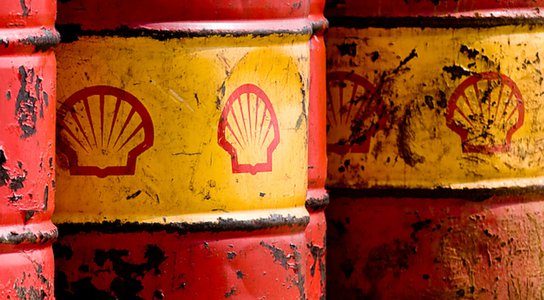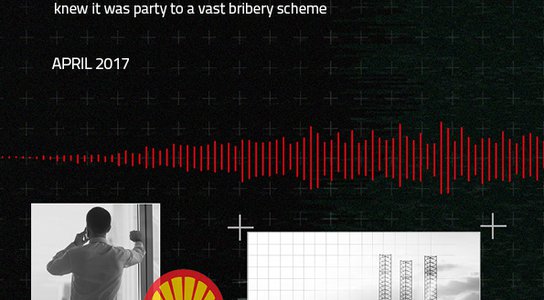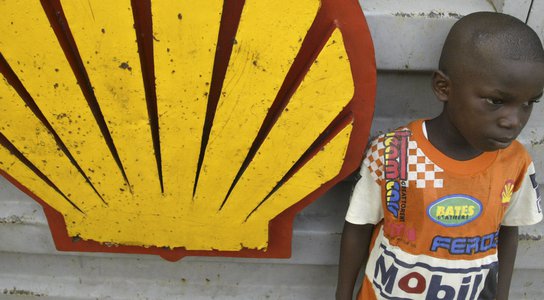New analysis shows Shell and Eni used Nigeria’s share of oil to fund their alleged billion dollar bribery scheme.
It must have been a good day at the Shell and Eni offices when they signed their contracts for the OPL 245 oil fields in Nigeria. Not only had they secured rights to one of Africa’s most promising oil blocks, they had also funded an upfront payment for it by including terms which granted them Nigeria’s share of oil.
The contracts they signed would be treated as a “production sharing contract” under Nigerian law. However, new research commissioned by Global Witness (PDFs here and here), together with our partners at HEDA, RE:Common and The Corner House, has found that the contract actually most resembles a “sole risk” contract - a kind not given to international oil companies since Nigeria’s late dictator Sani Abacha’s military regime fell in the 1990s.
So, why would signing a military-era contract have ‘made the day’ for Shell and Eni’s executives, several of whom are now standing trial in Milan on international corruption charges?
Research carried out by oil experts at Resources for Development Consulting has found that the terms of the contract reduced the Nigerian government’s likely share of revenue from the fields by $5.86 billion over the lifetime of the project. This is compared to a standard contract the companies might have been awarded and assuming a future oil price of $70 per barrel. The money Nigeria stands to lose is the equivalent of two years’ worth of Nigeria’s entire healthcare and education budget combined – money badly needed to build schools and pay doctors.
What’s even worse – if that’s possible – is that without these extraordinary terms, the companies would not have been able to stump up the massive $1.1bn upfront payment they made for the block in 2011. This payment has been at the centre of the scandal surrounding the license since Global Witness started reporting on the story in 2012 – and it is now at the centre of the criminal trial of the companies and their top executives. While Shell and Eni claimed their deal was only with the Nigerian Government, the money was in fact destined for former Oil Minister and convicted money launderer Dan Etete, who, according to prosecutors, used the cash to pay massive bribes to people including former Nigerian President, Goodluck Jonathan.
That’s right – Shell and Eni used Nigeria’s share of oil to fund an alleged bribery scheme, which saw money flow from the companies to shady individuals, instead of the Nigerian state and ultimately the Nigerian people.
There’s more. The deal heavily restricts the Nigerian state’sability to buy their rights back – requiring the country to pay $650m plus interest up-front to re-acquire their rightful stake. And under the type of contract the companies pushed for, that stake would only pay back an estimated $2 billion in future revenue- much less than Nigeria would have made under the standard contract.
The International Monetary Fund advises that a mature oil-producing nation like Nigeria should receive between 65% and 85% of oil or gas proceeds once costs are taken into account. Had standard contract terms been used on OPL 245, Nigeria would be set to receive around 65%: not perfect but within the IMF’s range. Under the deal Shell and Eni secured, Nigeria will only see a projected 41% - or 45% if Nigeria found that spare $650m plus interest to buy back some of their stake.
The OECD says the extractives sector is the most corrupt on the planet, and prosecutors in Milan and Nigeria seem to agree in this case.
This scandal has led to an unprecedented trial in Milan where Shell, Eni, their executives and Dan Etete are being prosecuted for international corruption offences. Nigeria is also pursuing civil claims against the oil giants over the deal, in which they claim “Shell and Eni engaged in ‘bribery and unlawful conspiracy’ to harm the Federal Republic of Nigeria and that they dishonestly assisted corrupt Nigerian government officials.”
It remains to be seen what will result from these legal actions. All the defendants have insisted on their innocence. But it is clear that Shell and Eni still hope to profit from this scandalous deal when it should not be allowed to stand.
Read the new reports here and here and follow our Oil Campaigner Barnaby Pace on Twitter for updates in the case and from the trial in Milan: @pace_nik


